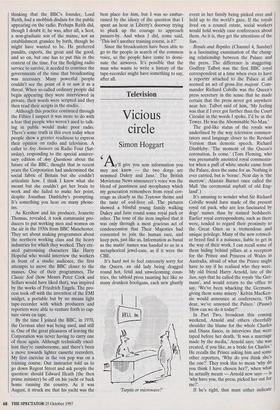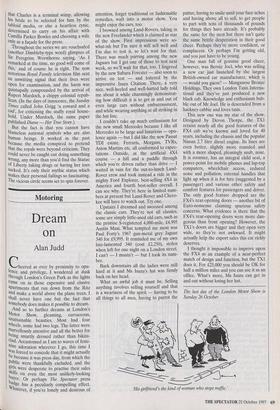Television
Vicious circle
Simon Hoggart
Ay'll give you sem information you mey not knew — the two dorgs are nemmed Dukey and Jane.' The British Movietone News announcer's voice was the blend of jauntiness and sycophancy which my generation remembers from royal cov- erage as clearly as the Toytown theme and the taste of cod-liver oil. The pictures showed a blissful young family walking Dukey and Jane round some royal park or other. The tone of the item implied that it was only through a most gracious act of condescension that Their Majesties had consented to join the human race, and keep pets, just like us. Information as banal as the mutts' names was handed to us in a metaphorical jewel-case, as if it were the CBE.
It's hard not to feel extremely sorry for the Queen, an old lady being dragged round hot, fetid and unwelcoming coun- tries, the tabloid press taunting her like so many drunken hooligans, each new ghastly Tarpits or microwave?' event in her family being picked over and held up to the world's gaze. If the royals lived on a council estate, social workers would hold weekly case conferences about them. As it is, they get the attentions of the Sun.
Royals and Reptiles (Channel 4, Sunday) is a fascinating examination of the chang- ing relationship between the Palace and the press. The difference is staggering. Godfrey Talbot was the first BBC royal correspondent at a time when even to have a reporter attached to the Palace at all seemed an act of gross lese majeste". Com- mander Richard Colville was the Queen's press secretary in the sense that he made certain that the press never got anywhere near her. Talbot said of him, `My feeling was that if I ever got further than the Court Circular in the words I spoke, I'd be in the Tower. He was the Abominable No-Man.'
The god-like status of the royals was underlined by the way television commen- tators used language closer to the Revised Version than demotic speech. Richard Dimbleby: 'The moment of the Queen's coronation. Is come.' (Tom Fleming, who was presumably anointed royal commenta- tor when a puff of white smoke came from the Palace, does the same for us. Nothing is ever carried, but is 'borne'. Next day is `the morrow'. Alastair Burnet once called the Mall `the ceremonial asphalt of old Eng- land'.) It's amusing to wonder what Sir Richard Colville would have made of the present royal rat pack, who are less fascinated by dogs' names than by stained bedsheets. Earlier royal correspondents, such as there were, tended to regard their proximity to the Great Ones as a tremendous and unique privilege. Many of the new rottweil- er breed find it a nuisance, liable to get in the way of their work. I can recall some of them hiding behind pillars at a reception for the Prince and Princess of Wales in Australia, afraid of what the Prince might have to say if he realised who they were. My old friend Harry Arnold, late of the Sun, says that he called the royals `the Ger- mans', and would return to the office to say, `We've been whacking the Germans, giving them some misery.' Kelvin MacKen- zie would announce at conferences, 'Oh dear, we've annoyed the Palace.' (Pause) `How can we do it today?'
In Part Two, broadcast this coming weekend, Arnold and others cheerfully shoulder the blame for the whole Charles and Diana fiasco, in interviews that were taped before her death. 'It was a marriage made by the media,' Arnold says; `she was created, if you like, as a bride for Charles.' He recalls the Prince asking him and some other reporters, 'Why do you think she's the one?' They took this to mean 'why do you think I have chosen her?', when what he actually meant — Arnold now says — is `why have you, the press, picked her out for me?'.
If he's right, that must either indicate that Charles is a terminal wimp, allowing his bride to be selected for him by the tabloid media, or else a heartless cynic, determined to carry on his affair with Camilla Parker Bowles and choosing a wife only as a facade for the press. Throughout the series we are vouchsafed (another Dimbleby-type word) glimpses of Sir Peregrine Worsthome saying, 'As I remarked at the time, no good will come of this,' and of course he is right. The now notorious Royal Family television film sent an unwitting signal that their lives were open for examination, and the harm was quintupally compounded by the arrival of Rupert Murdoch, a chippy colonial repub- lican. (In the days of innocence, the Sunday Times called John Grigg 'a coward and a cad', for criticising the stuffy royal house- hold. Under Murdoch, 'the same paper published Diana — Her True Story.) But the fact is that you cannot have blameless national symbols who are also human beings. It worked in the past because the media conspired to pretend that the royals were beyond criticism. They could never be caught out doing something wrong, any more than you'd find the Statue of Liberty taking drugs or having her toes sucked. It's only their mythic status which makes their personal failings so fascinating. The vicious circle seems set to spin forever.



















































































 Previous page
Previous page